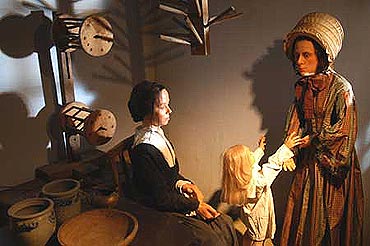Schrift: größer/kleiner
Inhaltsverzeichnis
Sie sind hier: WirRheinländer > english version > The Exhibition > Scenes > Weavers poor people
Weavers – poor people

The 19th century was characterized by immense economic and social changes. A population explosion and the liberation of peasants, together with industrialization, led to a fourth social stratum, the proletariat, a rapidly growing group of industrial day-labourers. Growth of the population created a surplus of labour. Wages fell, working conditions deteriorated. 90 working hours a week were necessary to meet the cost of liviing. Weavers were also affected by mechanization and the development of machines. In addition, competition from England made business even more difficult, because the Continental System was abolished in 1818 and the Prussian customs law was passed, based on free trade. Production in England was cheaper, where they were spinning and weaving with modern machines, while in the Rhineland it was largely a cottage industry run by distributors. At the beginning of the 1840's there were mass redundancies in the area of Mönchengladbach-Viersen-Krefeld, as well as around Wuppertal, due to cheap imports. The mayors of towns advised couples not to marry, as they would not be able to feed their children.
One old weaver's song goes as follows:
"Heavens, what misery rules the world
It's really the machines which are to blame
Filled our hearts with horrible dreams
A dark cloud obscures the sky
People's lives are grinding and hard
Oh, if only there were no machines
Many poor people would rest and eat
Oh, if only the devil would take the machines"


